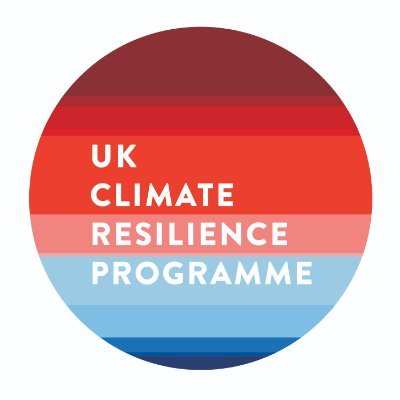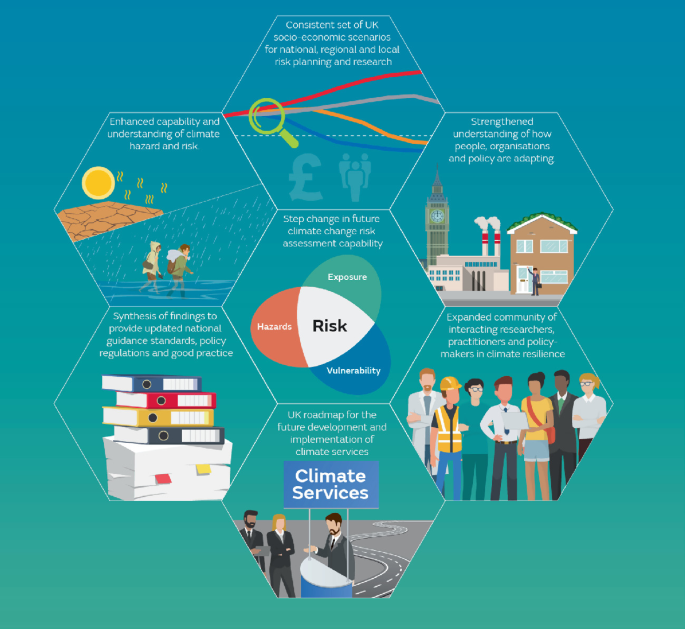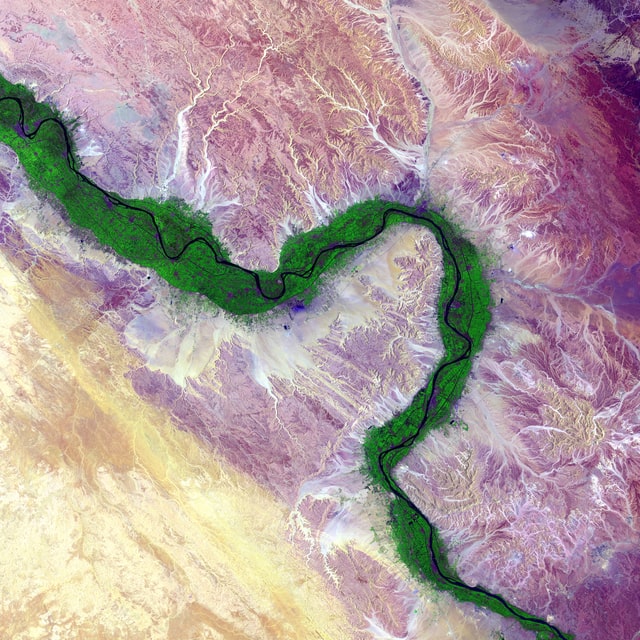Introducing the UK Climate Resilience Programme – book chapter

Summary
This article summaries the chapter ‘Introducing the UK Climate Resilience Programme’, as part of the book ‘Quantifying Climate Risk and Building Resilience in the UK‘, edited by Suraje Dessai, Kate Lonsdale, Jason Lowe, Rachel Harcourt.
Key points from this introductory chapter include:
- Research and policy relating to climate change risks and adaptation have been developing in the UK since the 1990s.
- The 2008 Climate Change Act established much of the framework for UK climate risk assessment and adaptation management.
- The UK Climate Resilience Programme was funded from 2018–2023 to address research gaps in characterising and quantifying climate risks, managing climate related risks through adaptation, and co-producing climate services.
- From the outset, the programme prioritised co-production, innovation, trans-disciplinary research, and working with stakeholders to ensure outputs were useful and usable.
This weADAPT article is an abridged version of the original text, which can be downloaded from the right-hand column. Please access the original text for more detail, research purposes, full references, or to quote text. The original document is available in the open access book in the front matter: Quantifying Climate Risk and Building Resilience in the UK; published by Palgrave Macmillan, Cham.
Introduction
Global and UK climate is changing at an unprecedented rate. New weather and climate records are being set, and there is growing evidence that human activity is influencing the probability of dangerous climate extremes. Further climate change is now inevitable, but the amount and pace of change will be shaped by the effectiveness of international climate mitigation policies. Recent past and projected future change mean that adaptation is critical in reducing climate risk and vulnerability in human and natural systems. The concepts of adaptation, vulnerability, resilience and risk provide overlapping, alternative entry points for the climate change challenge
In the 1990s, the UK government founded the Met Office Hadley Centre (1990), published the first national assessment of the possible impacts of climate change (1991) and established the pioneering UK Climate Impacts Programme (UKCIP) to bring together scientific research, policymaking and adaptation practice (1997). While UKCIP’s overarching aim was to help the UK adapt to the unavoidable impacts of climate change, its remit shifted over time—from engaging organisations on initial impact assessment, to occupying the boundary space between climate projections and research, supporting policy development (including the legislative requirements of the Climate Change Act 2008) and helping organisations develop and implement adaptation strategies and actions.
During the 2000s, more national climate change scenarios were published by the Met Office (2001 and 2009) and the UK developed a regional, multi-sectoral and integrated assessment of the impacts of climate and socioeconomic change in the UK. The Climate Change Act 2008 created a framework for adaptation to climate change, by establishing:
- the five-yearly, UK-wide Climate Change Risk Assessment (CCRA);
- that a National Adaptation Programme (NAP), must be put in place to address climate change risks and be reviewed following each CCRA;
- the ‘Adaptation Reporting Power’ (ARP), giving the government discretionary power to require relevant bodies to report on climate preparedness; and
- the Adaptation Sub-Committee (now the Adaptation Committee) of the independent climate change committee (CCC), to advise government and evaluate adaptation progress.
The UK government has since published three CCRAs (2012, 2017 and 2022), three NAPs for England (2013, 2018 and 2023) and there have been three rounds of ARP reporting. Responsibility for climate change adaptation is split between the four countries of the UK. The UK government is responsible for climate change adaptation in England and for reserved matters, with national governments in Northern Ireland, Wales and Scotland being responsible for adaptation in all devolved policy areas. The Adaptation Committee of the CCC has assessed progress of the UK and devolved governments in preparing for and adapting to the impacts of climate change.
The early 2010s saw the development of regional climate change partnerships under the umbrella ‘Climate UK’ (for example, the London Climate Change Partnership and Climate Northern Ireland) and the transfer of many of UKCIP’s functions to the Environment Agency’s Climate Ready Programme in 2012. Financial austerity in the public sector led to the closure of most of the regional climate change partnerships and in March 2016, the Climate Ready Programme also ended, leaving England largely devoid of a boundary organisation focused on climate impacts and adaptation (with the exception of the Marine Climate Change Impacts Partnership). However, since 2019 more than ten city and regional Climate Commissions have been established under the Place-based Climate Action Network (PCAN), working as independent advisory groups bringing together the public, private and civic sectors.
While undertaking the delivery of the CCRA2 evidence report, the then-named Adaptation Sub-Committee collated over 200 evidence gaps which were discussed and supplemented at a research needs conference in late 2016. The committee concluded that to progress understanding of climate risks in future CCRAs, the following cross-cutting evidence gaps needed to be addressed:
- UK spatial modelling capability;
- Socioeconomic scenarios for the UK;
- Decision support frameworks;
- Monitoring;
- Behaviour change;
- Adaptation options.
In 2017, the chair of the Adaptation Committee wrote to Research Council Chief Executives stating that a concerted multidisciplinary effort was required to support future CCRAs. In mid-2018, with support from Department for Environment, Food and Rural Affairs (Defra)’s Chief Scientist, the Natural Environment Research Council (NERC) and the Met Office jointly submitted a proposal for a programme on Climate Resilience to UK Research and Innovation (UKRI)’s Wave 1 Strategic Priorities Fund (SPF). The SPF UK Climate Resilience (UKCR) programme was approved in the autumn of 2018 at a total cost of £18.65 million over the period 2018–2023, as a partnership between UKRI and the Met Office.
About the UKCR programme
The Strategic Priorities Fund (SPF – see above) offered an opportunity to improve climate risk assessment and enhance UK resilience by encouraging and funding high-quality multi- and interdisciplinary research and innovation using integrative approaches that cross traditional disciplinary boundaries. It provided space for pioneering research, laying the foundation for future capability, and aimed to link effectively with government departments’ research priorities and opportunities. The UKCR programme is an example of SPF’s ability to respond with agility to strategic priorities and opportunities, and ensure the UK remains at the cutting edge of research.
The vision for the UKCR programme was:
To enhance the UK’s resilience to climate variability and change through frontier interdisciplinary research and innovation on climate risk, adaptation and climate services, working with stakeholders and end users to ensure the research is useful and usable.
The programme’s three main objectives were:
- Characterising and quantifying climate-related risks;
- Managing climate-related risks through adaptation;
- Co-producing climate services.
The science plan recognised that single disciplinary approaches will not be able to ‘solve’ this complex challenge and that multi- and interdisciplinary research efforts that include the natural sciences, social sciences, engineering, the arts and humanities are needed. It also recognised that the engagement and involvement of a wider range of stakeholders, such as practitioners and policymakers, are essential in addressing this challenge.
A programme board was established with representation from: the Met Office, NERC, AHRC (Arts and Humanities Research Council), ESRC (Economic and Social Research Council) and EPSRC. An independent steering committee was also established, to provide strategic input on the shape and delivery of the initiative, policy, alignment with other initiatives and opportunities for programme coordination and coherence. Following an interdisciplinary call to supplement ongoing UKRI Research Council awards/activities in climate resilience and a further call for the role of UKCR champion 19 projects were funded by NERC/UKRI, and Professor Suraje Dessai and Dr Kate Lonsdale, based at the University of Leeds, were appointed as champions to act as thought leaders, flag bearers and strategy owners for UKCR. The champions worked closely with the Met Office to ensure integration of the programme and development of strategy.
The champions and the Met Office led the development of a joint science plan, in consultation with UKRI and Met Office communities and climate resilience stakeholders from public, private and third sectors, while also taking into consideration government departments’ research priorities, the evolving UK climate resilience research landscape and the state-of-the-art in relevant disciplines. The science plan identified opportunities to significantly improve capabilities and address the challenges of quantifying risk and enhancing resilience. It was delivered through four main activities: frontier research, building research capability, developing and testing climate services, and coordination and networking activities. A central aspiration of the programme was to grow the community of interacting researchers, practitioners and policymakers in climate resilience. This underpinned all activities, but was particularly important in climate services, networking activities and the embedded researcher scheme. Guided by the science plan, UKRI issued seven open calls and the Met Office commissioned 13 external projects and 16 internal projects, resulting in more than 60 projects funded across the whole programme. The science plan envisioned a series of legacies for the programme, as shown in the following figure:

Building on the science plan, the programme developed a high-level narrative to link the outlined ‘legacy items’ with UKCR’s vision and objectives, articulating the activities needed to achieve the agreed legacy items, which would ultimately contribute to the programme goal of “enhancing the UK’s resilience to climate variability and change”. This narrative underpinned the monitoring, evaluation and learning plan for the programme. Programme activities were designed with consideration of the spectrum of knowledge brokering approaches, from ‘linear dissemination of knowledge’ to ‘co-production’. In addition to research excellence, the programme has assessed partnership and co-production, research relevance for target users, positioning of research outputs for use, and progress towards building a coherent climate resilience research community.
Book Roadmap
The ‘Quantifying Climate Risk and Building Resilience in the UK‘ book synthesises research conducted throughout the programme, through a series of chapters authored by UKCR researchers (usually a pairing from the Met Office and academia). Chapter 2 considers the key interpretations of climate resilience and its implications for practice. The rest of the chapters are organised in four parts:
Part 1: Undertaking Resilience Research
Part 2: Managing Climate Risks
- Explore the chapter: ‘Learning from Arts and Humanities approaches to building Climate Resilience in the UK’
Part 3: Tools for Resilience Building
- Explore the chapter: ‘What insights can the programme share on developing Decision Support Tools?’
Part 4: Understanding and Characterising Risk’
In the Afterword, the editors summarise and reflect on the research undertaken by the UKCR programme and conclude with a series of key learnings and priorities for future research.
Cite this chapter
Dessai, S., Lonsdale, K., Lowe, J., Harcourt, R. (2024). Introducing the UK Climate Resilience Programme. In: Dessai, S., Lonsdale, K., Lowe, J., Harcourt, R. (eds) Quantifying Climate Risk and Building Resilience in the UK. Palgrave Macmillan, Cham. https://doi.org/10.1007/978-3-031-39729-5_1




(0) Comments
There is no content